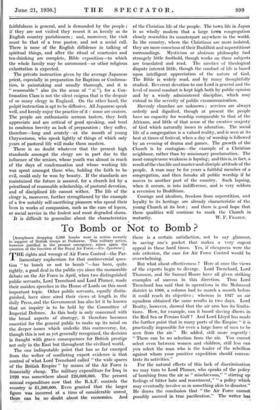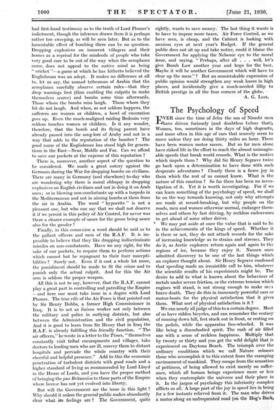To Bomb or Not to Bomb ?
(Aeroplanes dropping 5,000 bombs were in action recently in support of British 'troops at Peshawar. This military 'action; however . justified in the present emergency, raises again the question of the function of the Royal Air Force.—ED. Spectator.] THE rights and wrongs of Air Force Control—the Par- liamentary euphemism for that controversial ques- tion " to bomb or not to bomb "—has been, quite rightly, a good deal in the public eye since the memorable debate on the Air Force in April, when two distinguished public servants, Lord Trenchard and Lord Plume; made their maiden speeches in the House of Lords on this most important topic. Other public servants, equally distin- guished, have since aired their views at length in the daily Press, and the Government has also let it be known that an inquiry is to be held by the Committee of Imperial Defence. As this body is only concerned with the broad aspects of strategy, it therefore becomes essential for the general public to make up its mind on the deeper issues which underlie this controversy, for, though this is not as yet generally recognized, the decision is fraught with grave consequences for British prestige not only in the East but throughout the civilized world.
The one indisputable point that has so far emerged from the welter of conflicting expert evidence is that control of what Lord Trenchard called " the wide spaces of the British Empire " by means of the Air Force is financially Cheap. The military expenditure for Iraq in 1920 was somewhere about £20,000,000. The present annual expenditure now that the R.A.F. controls the country is 11,500,000. Even granted that the larger figure was incurred at a time of considerable unrest, thefe can le no doubt about the economies. And there is a certain satisfaction, not to say glamour, in saving one's pocket that makes a very cogent appeal in these hard times. Yes, if cheapness were the sole criterion, the case for Air Force Control would be overwhelming.
But what about effectiveness ? Here at once the views of the experts begin to diverge. Lord Trenchard, Lord Thomson, and Sir Samuel Hoare have all given striking examples of success in this direction. Thus Lord Trenchard has said that in operations in the Mohmand district in 1908, a column had to march a month before it could reach its objective ; whereas in 1927 an air squadron obtained the same results in two days. Lord Beatty, however, showed that the air arm has its limita- tions. How, for example, can it board slaving dhows in the Red Sea or Persian Gulf ? And Lord Lloyd has made the further point that in many parts of the Empire " it is practically impossible for even a large force of men to be seen from the air." He added, still more cogently " There can be no selection from the air. You cannot select even between women and children, still less can you select the man who is the leader of the rebellion against whom your punitive expedition should. concen: trate its activities."
For the natural effects of this lack of discrimination we may turn to Lord Plumer, who speaks of the policy of bombing from the air as " mischievous," " stirring 'up feelings of bitter hate and resentment," " a policy which may eventually involve us in soniething akin to disaster." He draws the conclusion that " the Air Force cannot possibly succeed in -true pacification." The Writer ha4 had first-hand testimony as to the truth of Lord Plumer's indictment, though the inference drawn from it is perhaps rather too sweeping, as will be seen later. But as to the lamentable effect of bombing there can be no question. Dropping explosives on innocent villagers and their homes as a reprisal for the misdeeds of people who take very good care to be out of the way when the aeroplanes come, does 'not appeal to the native mind as being " cricket "—a game-at which he has hitherto believed the Englishman was an adept. It makes no difference at all to, let us say, the nomad tribesman of Arabia that the aeroplanes carefully observe certain rules—that they drop warnings first (thus enabling the culprits to make themselves scarce) and bombs some time afterwards. Those whom the bombs miss laugh. Those whom they hit do not laugh. And when, as not seldom happens, the sufferers are women or children, a howl of execration goes up. Even the much-maligned raiding Bedouin very seldom touches women or children. Is it any wonder, therefore, that the bomb and its flying parent have already passed into the song-lore of Araby and not in a way that adds to the reputation of the bomber ? The good name of the Englishman has stood high for genera- tions in the East—Near, Middle and Far. Can we afford to save our pockets at the expense of this reputation ?
There is, moreover, another aspect of the question to be considered. We made a great outcry against the Germans during the War for dropping bombs on civilians. There are many in Germany (and elsewhere) to-day who are wondering why there is moral obloquy in dropping explosives on English civilians and not in doing it on Arab ones; or in blowing non-combatants up with a torpedo in the Mediterranean and not in aiming bombs at them from the air in Arabia. The word " hypocrite " is not a pleasant one, but who can say that we shall not deserve it if we persist in this policy of Air Control, for never was there a clearer example of sauce for the goose being sauce also for the gander ?
Finally, in this connexion a word should be said as -to the gallant officers and men of the R.A.F. It is im- possible to believe that they like dropping indiscriminate missiles on non-combatants. Have we any right, for the sake of our pockets, to require them to perform actions which cannot but he repugnant to their finer suscepti- bilities ? Surely not. Even if it cost a whole lot more, the punishment should be made to fit the crime and-to punish only the actual culprit. And for this the Air arm is seldom the proper weapon.
All this is not to say, however, that the R.A.F. cannot play a great part in controlling and patrolling the Empire —and here one must take issue in a degree with Lord Plumer. The true role of the Air Force is that pointed out by Sir Henry Dobbs, a former High Commissioner in Iraq. It is to act as liaison worker not only between the military and police in outlying districts, but also between the Administration and the civil population. And it is good to learn from Sir Henry that in Iraq the R.A.F. is already fulfilling this friendly function. " The air officers," he wrote in a letter to the Times, " themselves constantly visit tribal encampments and villages, take doctors to leading men who are ill, convey them to distant hospitals and pervade the whole country with their cheerful and helpful presence." Add to this the economic penetration of turbulent districts with good roads and a higher standard of living as recommended by Lord Lloyd in the House of Lords, and you have the proper method of bringing the pax Britannica to those parts of the Empire where license has not yet evolved into liberty.
But will the Government see the issue in this light ? Why should it unless the general-public makes abundantly clear what-its feelings are ? The GoVerninent, quite rightly, wants to save money. The last thing it Wants' is to have to impose more- taxes. Air Force Control, as we have seen, is cheap, and- the Cabinet is looking with anxious eyes at next year's Budget. If the general public does not sit up and take notice, could it blame the Government for applying the Nelsonic eye to the moral issue, and saying, " Perhaps, after all . . well, let's give Bomb Law another year and hope for 'the best. Idaybe it will be another Government which will have to clear up the mess ? But an unmistakable expression of public opinion would strengthen any weak knees 'in high places, and incidentally give a much-needed fillip to British prestige in all the four corners of the globe. - -A. G. Lus.









































 Previous page
Previous page